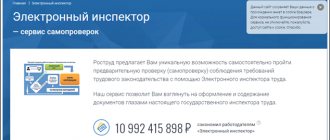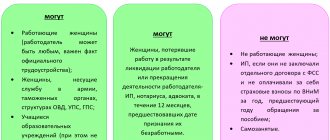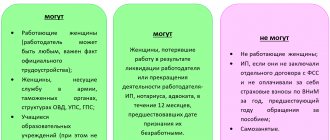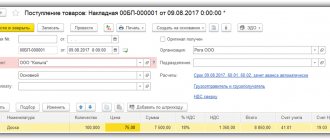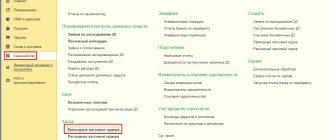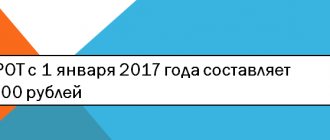As of July 1, 2021, new rules for the preparation and conduct of control and supervisory activities came into force - this phrase refers not only to inspections, but also to preventive procedures carried out by inspectors. Who will be checked more often, and who will not be included in the inspection plan at all? How can a business find out about upcoming inspections and how long will they last according to the new rules? How should I appeal the results of inspections now? How will small businesses be checked and what’s new in tax audits from 07/01/2021? The answers are in our material.
Who will be checked more often?
New approaches to inspections are prescribed in the Federal Law of July 31, 2020 No. 248-FZ “On State Control (Supervision) and Municipal Control in the Russian Federation,” the norms of which, for the most part, came into force on July 1, 2021.
The law stipulates that when planning inspections, inspectors must use a risk-based approach: the higher the risks in relation to the object of control, the more frequent the inspections.
Inspectors are not allowed to simply select a company for inspection. The choice must be justified. For this purpose, a new concept was introduced - the category of risk of harm (damage) (Article 23 of Law No. 248-FZ).
The risk of harm (damage) is the probability of events that may result in harm (damage) of varying scale and severity to legally protected values.
Risks are divided into six categories:
| Risk level | Frequency of control activities |
| Extremely high | At least one, but no more than two events per year |
| High/significant | At least one event every four years and no more than two events every two years |
| Medium/moderate | At least one event every six years and no more than one event every three years |
| Short | There are no events |
It turns out that inspectors will come with inspections more often to those businessmen whose activities result in negative consequences for the interests of society.
If the likelihood of such consequences occurring is minimal, inspections will not be scheduled or carried out. The list of indicators of the risk of violation of mandatory requirements by type of control and the procedure for their identification are approved by government authorities at each level: federal, regional and municipal. For example, risk indicators when carrying out fire supervision are listed in the Order of the Ministry of Emergency Situations dated 06/07/2021 No. 364.
What inspection can inspectors come with?
According to the new rules, inspectors have the right to come to a businessman with checks, the list of which is enshrined in a special regulatory act - in a regulation or law on a specific type of control.
Checks can be of two types: those carried out with direct interaction between the controlled person and the controller, and those carried out without such interaction.
Among the activities of the first group are on-site inspection, documentary inspection, and test purchase, which are familiar to everyone. New types of inspections have been added to them (clause 2 of article 56 of Law No. 248-FZ):
- monitoring purchase;
- selective control;
- inspection visit;
- raid inspection.
For example, Rospotrebnadzor, when conducting inspections in the field of consumer rights protection, has the right to use all of the specified methods (clause 22 of the Regulations on federal state control (supervision) in the field of consumer rights protection, approved by Government Resolution No. 1005 of June 25, 2021). And labor inspectors can only use such methods as an inspection visit, raid inspection, documentary and on-site inspections (clause 35 of the Regulations on federal state control (supervision) over compliance with labor legislation and other regulatory legal acts containing labor law norms, approved by the Resolution Government dated July 21, 2021 No. 1230).
Without contact with a controlled person, two types of control (supervisory) measures are carried out (clause 3 of Article 56 of Law No. 248-FZ):
- monitoring compliance with mandatory requirements;
- on-site examination.
From 07/01/2021, inspection bodies have not only new methods of control, but also new tasks (more on this later).
Normative base
All areas of business activity are subject to control. The extensive list of supervisory structures includes: GIT, tax, Rostechnadzor, fire inspection, Rosfinnadzor. Each of them can come to the enterprise for an inspection, but this process is strictly regulated.
Main regulations:
- Regulations on state supervision, approved by Government Decree No. 875 of September 1, 2012 . At the beginning of 2022, significant adjustments were made to this act related to the risk-based approach to labor protection (Resolution No. 197 of February 16, 2017). These changes affected the frequency with which scheduled inspections of GIT are carried out.
- Law No. 294-FZ of December 26, 2008 , which regulates the timing and procedures of supervisory activities. This act ensures the protection of the rights of entrepreneurs in the process of state control.
| Federal Law No. 294-FZ covers most forms of control, but not all. For some events, special regulations apply. This is determined by Article 1 (clauses 3, 3.1, 4–4.2) of this law. |
Modern economic realities are changing rapidly and legislation reacts flexibly to this: changes and additions are periodically made to regulations. We recommend that you regularly monitor and study the latest editions in order to fully comply with the requirements of the law and successfully pass government audits.
How to find out about verification
You can find out about the upcoming inspection in the unified electronic register of CNM (control and supervisory activities), which is maintained by the Prosecutor General's Office. The new register concentrates all the information about the inspections: by which department and in what time frame they were carried out, what decisions were made based on the results, how they were carried out, who was punished and how.
We tell you more about the registry here.
In addition, controllers are required to notify the businessman about an inspection or other control (supervisory) event (with the exception of such events as test purchase, monitoring purchase, sample control and inspection visit).
You will be notified of an unscheduled on-site inspection no later than 24 hours in advance. Laws on specific types of controls may provide exceptions to this rule. For example, they will not notify the catering company when carrying out sanitary and epidemiological control (Article 44 of the Federal Law of March 30, 1999 No. 52-FZ “On the Sanitary and Epidemiological Welfare of the Population”).
In some cases, information about the inspection enters the register immediately after the control event. For example, during an on-site inspection that developed into a test purchase.
Controllers are not required to notify of any unscheduled inspection if there is information about an immediate threat of harm (Article 66 of Law No. 248-FZ).
Inspection deadlines
No more than 10 working days are allocated by law for a documentary or on-site inspection (Articles 72-73 of Law No. 248-FZ). If a business has divisions in different regions, the deadline is set separately for each of them.
An inspection visit should last no more than one working day at one facility (Article 70 of Law No. 248-FZ).
No more than 10 working days are allotted for the raid inspection, including no more than one working day for interaction with one inspector (Article 71 of Law No. 248-FZ).
For other control (supervisory) activities, the deadlines are determined based on the period of time that is usually needed to conduct examinations, remove samples or conduct a purchase.
New ways to control employers
When conducting a control event (scheduled or unscheduled), inspectors may use documentary or on-site inspections. In this case, there are no changes in terms of the control mechanism. However, the time frame for conducting these checks has been reduced.
But now the labor inspectorate can use new ways to control employers in the field of labor relations - an inspection visit and a raid.
An inspection visit is a short-term check during 1 day, carried out at the employer's premises. During this control event, production and premises are inspected, employees and management are interviewed, written explanations are received and documentation is requested. An inspection visit does not require prior notification of the employer about its conduct, but it must ensure unhindered access to its territory for labor inspectorate employees.
A raid inspection is a short-term inspection of employers located in a specific territory. For example, this could be a district of a municipality or a regional center. When conducting an on-site inspection, GIT specialists have the right not only to conduct an inspection, but also to interview workers, receive written explanations, demand documents for inspection and order an examination.
During a raid inspection, employers must provide GIT specialists with access to production facilities and premises (with the exception of residential premises), which are specified in the decision to conduct a raid inspection.
Important! Inspection visits and raids are only unscheduled. These control measures are carried out in agreement with the prosecutor's office, and employers are not required to be notified.
Prevention of violations is a top priority
According to the new law on inspections, the main task of control (supervisory) bodies is not to increase the number of inspections and the amount of penalties imposed, but to prevent violations (Article 8 of Law No. 248-FZ).
The law establishes a specific list of preventive measures used by inspectors from 07/01/2021 (Article 45 of Law No. 248-FZ):
- informing;
- generalization of applied practice;
- measures to encourage integrity;
- announcement of warning;
- consulting;
- self-examination;
- preventive visit.
Special control modes
In addition to inspections and preventive measures, the new rules provide for two special state control regimes (Chapter 18 of Law No. 248-FZ):
- monitoring;
If a businessman has concluded a monitoring agreement with controllers and organized the process for the inspectors to obtain the necessary data, he is exempt from planned control (supervisory) activities regarding compliance with the mandatory requirements that are the subject of such monitoring.
- constant state control (supervision).
Under such a special control regime, businessmen are obliged to provide inspectors with unhindered access to objects of constant control, documents and information resources, and technological means used at such objects.
For verification - only with a QR code
According to the new rules of Law No. 248-FZ, controllers are required to coordinate almost all control and supervisory activities with the prosecutor’s office and receive a QR code for each event.
Such a code is generated by a unified register of KNP, which provides a transition to a page on the Internet containing an entry from a unified register about an inspection or preventive measure within the framework of which the document was drawn up (clause 21 of Government Decree No. 604 dated April 16, 2021).
If the inspectors did not present the businessman with a decision to conduct an inspection with a QR code, or the businessman did not find a specific inspection in the unified KNM register (if, by law, it should be there), he has the right not to allow inspectors into his territory at all. If the inspectors nevertheless carried out an unauthorized control event, such an inspection will not be recognized as legal and its results will be easy to challenge.
Information about each inspection in the KNM register is reflected under a separate unique number, by which the merchant can immediately familiarize himself with the subject of the inspection and other information placed in the inspection passport.
Unscheduled inspections of employers
Unscheduled inspections are carried out without prior notification to employers, and therefore are often unexpected for them.
The list of grounds on which unscheduled inspections are carried out by the labor inspectorate is established in Law No. 248-FZ dated July 31, 2020. In particular, these include the following:
- availability of information from the labor inspectorate about violations committed by the employer. For example, the State Tax Inspectorate received a complaint or appeal that the employer, through his actions, created a potential threat to the life or health of employees. This information may come from other companies, individuals, law enforcement agencies, etc.;
- order of the President of the Russian Federation or the Government of the Russian Federation to carry out an unscheduled inspection against the employer;
- the request of the prosecutor's office to carry out a control measure on materials or appeals received to it;
- expiration of the deadline for execution of the decision of government agencies to eliminate the violation that was discovered earlier;
- receipt from the employer of information on the elimination of violations of requirements regarding licensing of activities, accreditation, certification, inclusion in the register, etc. In this situation, an unscheduled inspection is carried out only as an assessment of the elimination of identified violations.
Before conducting an unscheduled inspection, the event must be agreed upon with the prosecutor's office, and the employer must be notified about it. Notification involves sending a copy of the decision to conduct an unscheduled inspection no less than 24 hours before the start of the event.
If it is necessary to verify messages or complaints about violations by the employer received by the labor inspectorate, then inspectors can conduct an unscheduled inspection immediately. In other words, within 24 hours from the moment inspectors receive such information, with mandatory notification to prosecutors within the same period. In such a situation, the inspectorate has the right not to notify the employer that an unscheduled inspection will be carried out.
Electronic verification passport
In the register of inspections, a separate electronic passport (KNM passport) is issued for each control and supervisory event, be it an inspection or a preventive procedure.
The KNM passport reflects a set of information about the verification:
- the nature of the event (for example, “Scheduled inspection under 248-FZ, approved according to plan 294-FZ”);
- status (for example, “pending”);
- date of registration in FSIS ERP;
- type (on-site inspection, documentary inspection, etc.);
- details of the decision to conduct an inspection: date, number, full names of officials;
- start and end dates of the audit;
- the name of the prosecutor's office with which the inspection was agreed upon;
- subject of verification (more on this in the next section);
- address of the place of inspection;
- date and method of notifying the person being inspected of the inspection.
This is open data that anyone can get acquainted with by entering, for example, the name of the organization or its tax identification number in the search bar:
Information about the decision based on the results of the inspection and the measures taken are available only to the person who was inspected. You can get them using your account on the State Services portal or your personal account in the departmental information system.
The arbitrariness of inspectors was reduced to a minimum
From 07/01/2021, inspectors will not be able to simply show up for an unauthorized inspection - Law No. 248-FZ and departmental regulations on types of control specify the permissible types of inspections and preventive measures, and strictly regulate their composition and timing.
It is now also difficult for inspectors to act without permission during inspections. The subject of the control and supervisory activity is reflected in the KNM’s passport, so the merchant knows it in advance. For example, in the inspection passport by the labor inspectorate, the articles of the Labor Code of the Russian Federation are indicated as the subject of inspection, compliance with the norms and provisions of which will be checked:
In the section “Subject of control (supervisory) activity” of the inspection passport, several mandatory requirements (regulatory acts, compliance with which will be verified) may be indicated. For example, an inspection certificate within the framework of fire control may indicate: compliance with fire safety standards (Ministry of Emergency Situations orders No. 323, 315), requirements of fire safety standards PPR 1479, compliance with the requirements of technical regulations on fire safety requirements (Federal Law dated July 22, 2008 No. 123- Federal Law “Technical Regulations on Fire Safety Requirements”), norms of Federal Law dated December 21, 1994 No. 69-FZ “On Fire Safety”, compliance with the requirements of Order of the Ministry of Emergency Situations No. 645 on training employees in fire safety measures, etc.
Inspectors do not have the right to go beyond the scope of the CNM item indicated in the inspection passport. Law No. 248-FZ sets out detailed rules for conducting each event. They differ in the set of permissible control and supervisory actions. These include inspection, search, questioning, requesting documents, experiment, etc. Inspectors are required to act within the framework established by law and it will no longer be possible to act arbitrarily during any inspections.
Purpose of the law
Law N 248-FZ is aimed primarily at preventing violations, as well as introducing more lenient control measures. The law includes the possibility of taking the following actions:
- Sampling control, which is the selection of samples of product samples. It will be used to verify product compliance with mandatory legal requirements.
- Monitoring procurement will be introduced. It will be carried out in order to send the product or the result of work for examination. In general, this event is similar to a test purchase.
- Legal entities and individual entrepreneurs will now have to ensure that the inspector has access to them as part of an inspection visit. There will be no prior notice of the visit.
- Inspectors will have the opportunity to inspect publicly accessible production facilities as part of an on-site inspection. To do this, they will not have to interact with controlled persons.
At the same time, rules are defined for each event. Inspectors' ability to act will be limited. They have the right to inspect, search, question and demand documents, as well as take other actions. It is expected that this will reduce the possibility of arbitrary inspections.
In addition, the period for documentary and on-site inspections will be reduced: from the current 20 working days to 10 working days.
Among other things, it will be possible to cancel decisions made as a result of any control and supervisory activity carried out with gross violations. Currently, only the results of checks can be overturned. In Art. 92 of Law N 248-FZ lists gross violations that will allow decisions to be overturned.
These include:
1) lack of grounds for carrying out control (supervisory) measures;
2) lack of agreement with the prosecutor’s office for the conduct of control (supervisory) activities in the event that such agreement is mandatory;
3) violation of the requirement to notify about the conduct of a control (supervisory) event if such notification is mandatory;
4) violation of the frequency of scheduled control (supervision) activities;
5) carrying out a planned control (supervisory) activity not included in the corresponding plan for carrying out control (supervisory) activities;
6) making a decision based on the results of control (supervisory) activities based on an assessment of compliance with the provisions of regulatory legal acts and other documents that are not mandatory requirements;
7) involvement in the control (supervisory) activities of persons whose participation is not provided for by this Federal Law;
violation of the deadlines for carrying out control (supervisory) activities;
9) performance of control (supervisory) actions during a control (supervisory) activity that are not provided for by this Federal Law for this type of control (supervisory) activity;
10) failure to provide a controlled person with a document regarding the results of a control (supervisory) activity if the obligation to provide it is established by this Federal Law;
11) carrying out control (supervisory) activities not included in the unified register of control (supervisory) activities.
Appealing inspection results
According to the new rules, when appealing the results of inspections, it is necessary to follow the pre-trial appeal procedure. It is valid for 59 types of control listed in Government Decree No. 663 dated April 28, 2021.
To file a complaint, you need to go to the “Catalog of departments” section on the State Services website, select the desired department and fill out an electronic complaint, sign the UKEP and send it. Complaints that do not contain secrets protected by law are submitted through the State Services website (Article 40 of Law No. 248-FZ).
The complaint must be considered within no more than 20 working days from the date of its registration. This period may be extended, but not by more than 20 working days.
The text of the complaint within the framework of the pre-trial appeal, its status and the result of the consideration will be included in the register of the KNM. During a judicial appeal, information about the results will appear in the register if the decisions of the controllers are changed or canceled (Government Decree No. 604 of 04/16/2021).
New deadlines for GIT inspections
Compared to the previously valid ones, the new inspection timeframes have been significantly reduced. For example, according to the new rules, a documentary check should be carried out within a period of no more than 10 working days (previously - 20 working days). This period does not include the time from the date the labor inspectorate sent the request for documents to the date of their direct submission to the State Labor Inspectorate.
In addition, the total period does not include the period from the date of sending to the employer information about detected errors and contradictions in the received documentation until the date of submission of the relevant explanations.
The deadline for on-site inspections was also reduced to 10 working days (previously 20 working days). According to the updated rules, it is separately stipulated that for a small business entity, the total period of such an inspection cannot be more than 50 hours for a small company and 15 hours for a micro company.
When an on-site inspection is carried out for a company operating on the territory of several constituent entities of the Russian Federation, the period for conducting the inspection is determined separately for each branch, representative office or separate division.
For an inspection visit at one production facility, the period for its implementation is 1 working day. For an on-site inspection, the maximum period for conducting an inspection is 10 working days. In this case, the verification of a specific employer during a raid inspection cannot take more than 1 working day.
You can purchase services that help you work as an accountant here.
Do you want to install, configure, modify or update 1C? Leave a request!
Did you like the article?
Want to receive articles like this every Thursday? Keep abreast of changes in legislation? Subscribe to our newsletter
Small business audits
In 2022, there is a moratorium on inspections of small businesses, which was extended until the end of 2022 (Government Decree No. 1520 dated 09/08/2021). Scheduled inspections of this category of businessmen will not be included in the plan of control and supervisory activities for the next year.
But not all businessmen from the register of small and medium-sized businesses are exempt from control and supervisory measures. Controllers are still allowed to make scheduled visits to businessmen in four cases:
- in relation to inspections of persons, the activities (objects) of which are classified as high-risk categories (hazard classes), as well as for which a regime of constant state control (supervision) has been established;
- if less than 3 years ago an inspection was completed in relation to the SME, as a result of which an effective decision was issued on an administrative penalty for committing a gross violation, including disqualification or suspension of activities, suspension or revocation of a license;
- if the inspection is carried out to ensure that licensees comply with licensing requirements;
- during scheduled inspections of external quality control of audit organizations and within the framework of federal state control in the field of atomic energy use.
Tax officials have the right to come to all businessmen with inspections, including “little ones,” since the moratorium does not apply to control activities within the framework of tax control. The moratorium does not apply to a number of other control measures (currency and customs checks, procurement control under the laws of April 5, 2013 No. 44-FZ “On the contract system in the field of procurement of goods...” and dated July 18, 2011 No. 223-FZ “On the procurement of goods , works, services...", financial control).
Scheduled inspections of employers
On July 23, 2022, Government Resolution No. 1230 of July 21, 2021 came into force, according to which a new regulation was approved on the rules and mechanism for carrying out scheduled and unscheduled inspections of employers. Scheduled inspections this year, the date of which was later than July 23, were carried out according to the updated rules.
Scheduled inspections are carried out in accordance with the control activities plan for the next calendar year, which is agreed upon with the prosecutor's office.
In accordance with the new procedure, based on a risk-based approach, the frequency of scheduled inspections is influenced by the risk group to which the employer is assigned. A total of 5 risk groups have been identified - high, significant, medium, moderate and low. The decision about which risk group the employer belongs to is made by the labor inspector.
When an employer is assigned a particular risk group, scheduled inspections are carried out at the following frequency:
- high - once every 2 years;
- significant - once every 3 years;
- average - once every 5 years;
- moderate - once every 6 years.
If an employer is classified as low risk, then scheduled inspections are not carried out. When an employer does not fall into either group, it is considered to be low risk.
A risk level is assigned to employers every year no later than July 1 of the current year for application in the next year. Information about the assigned risk category is posted on the Rostrud website.
Since 2022, scheduled inspections are not carried out for companies and individual entrepreneurs related to SMEs, information about which is available in the register of SMEs. This is stated in Government Decree No. 1969 dated November 30, 2020. Accordingly, the list for each year includes employers who belong to medium and large businesses.
The exception in this case is small businesses that were previously brought to administrative responsibility for committing a gross violation, to disqualification or administrative suspension of activities. These business entities are included in the inspection plan in accordance with the general procedure.
Tax audits according to new rules
From 07/01/2021, according to the updated rules, tax officials conduct desk and on-site audits during the period of tax monitoring. Now a desk audit is carried out in the only case - if the initial or updated declaration is submitted less than three months before the early termination of tax monitoring (clause 3 of article 1 of the Federal Law of December 29, 2020 No. 470-FZ).
An on-site inspection will be scheduled in the following situations:
- upon early termination of tax monitoring;
- if the taxpayer fails to comply with the motivated opinion of the Federal Tax Service;
- within the framework of control over the Federal Tax Service, which carried out the monitoring;
- if an updated declaration is submitted for the period of tax monitoring, in which the amount of tax payable is reduced, the amount of loss is increased, or the amount of VAT and excise tax is to be reduced (clause 4 of Article 1 of Law No. 470-FZ).
Inspectors now have more powers. From July 1, 2021, they have the right (clause 6 and clause 7 of Article 1 of Law No. 470-FZ):
- conduct a review as part of tax monitoring of the VAT return with the amount to be reimbursed if inconsistencies and contradictions are identified in it;
- request documents and information from counterparties and other persons who have information about the organization participating in tax monitoring.
Let us recall that tax monitoring is a form of tax control in which a company voluntarily provides tax authorities with online access to its accounting and tax records, and they, in turn, instead of desk and field audits, control the calculation of taxes in real time and inform the taxpayer about errors.
If you have any unresolved questions, you can find answers to them in ConsultantPlus.
Full and free access to the system for 2 days.
Deadlines for on-site tax audits in 2022
In fact, the maximum period for an on-site tax audit is 1 year. This is factual. And according to the law, the inspection cannot last longer than 6 months (or rather, the inspection can last 2 months, and then the period can be extended to 4, then to 6). This period is established by Art. 89 Tax Code of the Russian Federation. How does one get a year?
There is such a thing - suspension of an on-site tax audit. The tax office can suspend the audit as many times as desired. This is done so that inspection days are not wasted.
For example, the tax office has requested documents from counterparties and suspends the inspection until it receives a response: inspectors simply have nothing to do until a response is received from the counterparty. While the inspection is suspended, the inspection does not come to you for inspection, does not require documents, does not interrogate witnesses, etc. The total period of suspension of an on-site tax audit (maximum possible) is six months.
So it turns out: 6 months of the inspection itself, 6 months of suspension = 1 year. An on-site inspection can last exactly that long, and not a day more. The period is calculated from the date of the decision on the inspection until the date of drawing up the certificate of completion of the inspection.
Let's sum it up
- From 07/01/2021, most of the provisions of the Federal Law of 07/31/2020 No. 248 “On state control (supervision) and municipal control in the Russian Federation” came into force.
- The selection of applicants for inspections is now based on a risk-based approach—those businessmen whose activities result in negative consequences for the interests of society will be inspected more often.
- Appealing the results of inspections should be carried out pre-trial and only after that can you go to court.
- In addition to inspections, inspectors are obliged to engage in the prevention of violations, for which the law provides for special types of measures: information, financial incentives and others.
